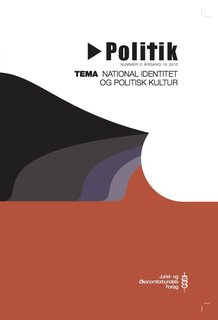Europæiske partiers partifamilier og politiske ideologi
DOI:
https://doi.org/10.7146/politik.v13i2.27451Abstract
In day-to-day politics as well as in the field of political science we make frequent use of such terms as Liberal, Social Democrat and Conservative, thus implicitly assuming that we can derive the political positions of a party simply by looking at the party family it belongs to. These labels grew out of a series of political processes in the eighteenth century, and it is therefore questionable whether they have retained their relevance in a time where voter dealignment is commonplace, parties tend to be less ideological and less attached to certain classes or societal groups, and new issues have come to the forefront of political debate. Using a new dataset compiled during the 2009 European Parliament election, it is studied whether the parties belonging to the same party families still have roughly similar ideological attitudes, or party families today are too fragmented politically to constitute a useful analytical concept. The study finds that party families generally speaking are characterized by a relatively high degree of internal cohesion. However, on certain questions many party families do not exhibit a high degree of coherence, indicating that the degree of coherence has decreased with the advent of new political issues. Also, the liberal party family exhibits very low degrees of coherence, and it is questionable whether the liberal parties in fact have enough in common to justify categorizing them under the same ideological heading.
Downloads
Published
How to Cite
Issue
Section
License
Forfattere, der publicerer deres værker via dette tidsskrift, accepterer følgende vilkår:
- Forfattere bevarer deres ophavsret og giver tidsskriftet ret til første publicering, samtidigt med at værket er omfattet af en Creative Commons Attribution-licens, der giver andre ret til at dele værket med en anerkendelse af værkets forfatter og første publicering i nærværende tidsskrift.
- Forfattere kan indgå flere separate kontraktlige aftaler om ikke-eksklusiv distribution af tidsskriftets publicerede version af værket (f.eks. sende det til et institutionslager eller udgive det i en bog), med en anerkendelse af værkets første publicering i nærværende tidsskrift.
- Forfattere har ret til og opfordres til at publicere deres værker online (f.eks. i institutionslagre eller på deres websted) forud for og under manuskriptprocessen, da dette kan føre til produktive udvekslinger, samt tidligere og større citater fra publicerede værker (se The Effect of Open Access).

